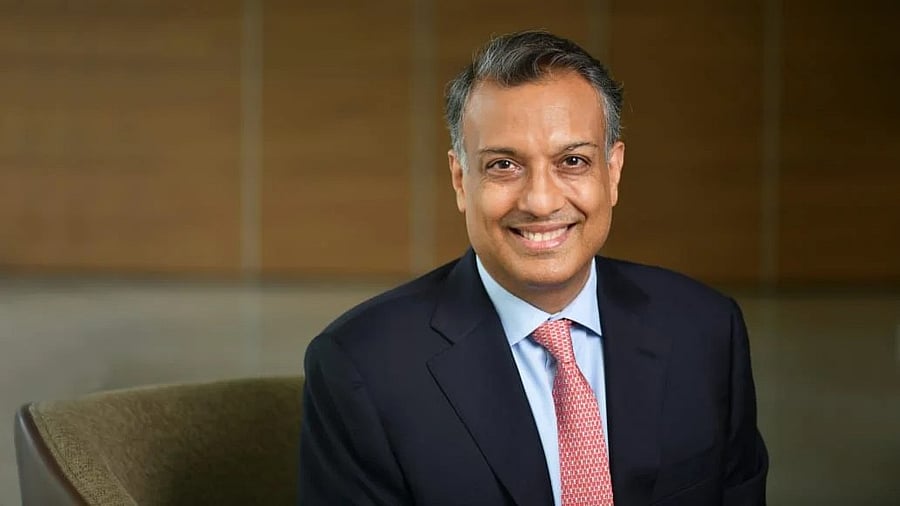
Sumant Sinha.
Credit: Special Arrangement
NASDAQ-listed leading decarbonisation solutions company, ReNew Energy Global Plc, last week announced that it will invest Rs 60,000 crore ($6.7 billion) in Andhra Pradesh, to set up multiple green energy projects in the state, taking its total fresh investment in AP to Rs 82,000 crore ($9.3 billion). In an exclusive interview with DH’s SNV Sudhir, ReNew Energy Founder, Chairman and CEO Sumant Sinha lays out his company’s ambitious future plans, and also hopes that over 2-3 years, India will have a fully-domestic solar manufacturing chain, the only country besides China to have it, positioning the country as a major alternative supplier globally. Edited Excerpts:
Could you tell us about the MOUs and their significance?
We have signed MOUs amounting to Rs 82,000 crore with Andhra Pradesh. There are several components to the agreements — a wind-solar-battery hybrid project in Anantapur, with a peak capacity of close to 5 GW; an ingot wafer plant; a pump storage project; and a green hydrogen hub we plan to set up. The combined investment is Rs 82,000 crore, which will be split among the various projects. The funds are expected to be deployed over 4-5 years, subject to necessary government approvals and procedures.
Why did ReNew choose Andhra Pradesh for these investments?
Andhra Pradesh offers strong wind and solar natural resources, yet relatively low penetration of renewable projects so far. In addition, the leadership, namely Chief Minister N Chandrababu Naidu and IT, Electronics and Communication Minister Nara Lokesh, have been remarkably supportive. We’ve received assurances for fast-track approvals, single-window clearance, and readily available representatives in Delhi for assistance. Their responsiveness regarding land allocations and incentive announcements has been reassuring, making AP an attractive place to do business.
How much land will be required for the Rs 82,000-crore investments?
The requirements vary greatly between projects. Manufacturing, solar, and pumped hydro — each needs very distinct types of land. It’s difficult to provide a specific number due to these differences.
Out of the Rs 82,000 crore, how much has already been executed in May?
No, these projects have not been executed earlier. There is one that started a few months ago, for which the foundation stone was laid by Nara Lokesh. That project is worth about Rs 20,000 crore, but the rest have been newly announced.
Could you elaborate on your overall plans for the Indian market and solar manufacturing?
India now has surplus module manufacturing capacity of around 100 GW, versus current demand of about 50 GW. For cells, imports will be stopped from June next year, and we’re ramping up our cell manufacturing (currently 2.5 GW, expanding to 6.5 GW). Modules are balanced at 6.5 GW for us. The government plans to stop wafer imports by 2028, making it necessary to set up domestic wafer production, and Andhra Pradesh is our chosen location. No one in India currently manufactures wafers, but capacity will be added progressively as import restrictions begin. As for balancing demand and supply, it will never be perfect due to various delays and market factors, but over 2-3 years, India will have a fully domestic solar manufacturing chain, the only country apart from China to have it, positioning the country as the major alternative supplier globally.
Is ReNew seeing demand for clean energy from data centres and other new sectors?
Yes, emerging sectors like data centres are creating new demand for clean energy. We’re in discussions with some companies about their specifications for power quality and flexibility, and we’ll see what tailored solutions we can provide.
What are ReNew’s plans concerning green hydrogen and the carbon market?
We are actively developing a green hydrogen hub in Andhra Pradesh. Global and domestic demand for green fuels is still limited due to higher costs, compared to conventional (grey) hydrogen and ammonia. The industry is preparing for future demand, with capex investments to follow as market growth justifies it.
What other plans does ReNew have beyond the announced investments?
As a public company, full details of future plans require formal disclosure to investors. But we have about 8 GW of Power Purchase Agreement (PPA) signed, in addition to our currently commissioned projects, and another 6.5 GW of LOAs awaiting conversion
to PPAs. Some of this capacity is part of the Rs 82,000 crore investments for AP, while some will be developed in other states.